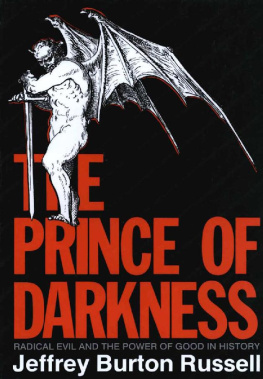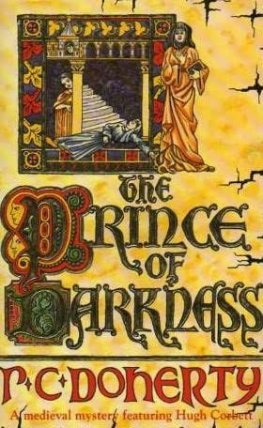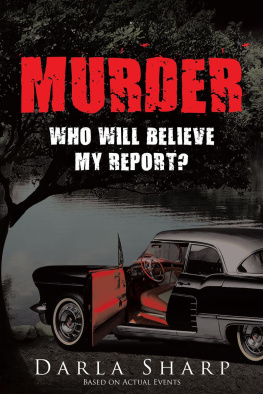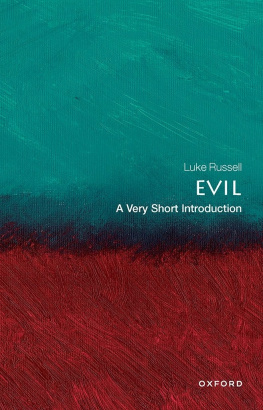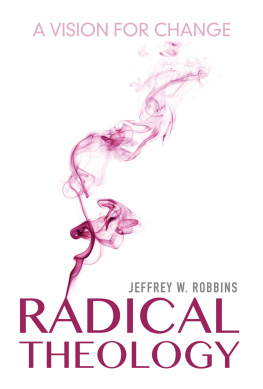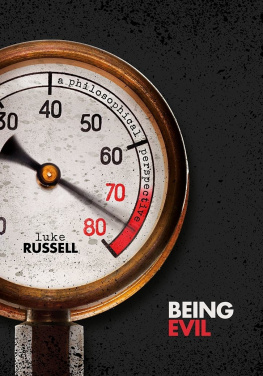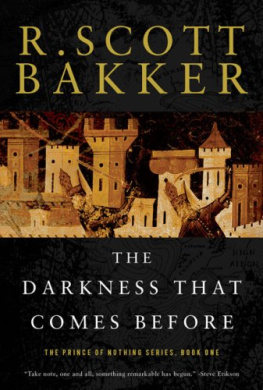Jeffrey Burton Russell - The Prince of Darkness: Radical Evil and the Power of Good in History
Here you can read online Jeffrey Burton Russell - The Prince of Darkness: Radical Evil and the Power of Good in History full text of the book (entire story) in english for free. Download pdf and epub, get meaning, cover and reviews about this ebook. year: 2016, publisher: Cornell University Press, genre: Religion. Description of the work, (preface) as well as reviews are available. Best literature library LitArk.com created for fans of good reading and offers a wide selection of genres:
Romance novel
Science fiction
Adventure
Detective
Science
History
Home and family
Prose
Art
Politics
Computer
Non-fiction
Religion
Business
Children
Humor
Choose a favorite category and find really read worthwhile books. Enjoy immersion in the world of imagination, feel the emotions of the characters or learn something new for yourself, make an fascinating discovery.
- Book:The Prince of Darkness: Radical Evil and the Power of Good in History
- Author:
- Publisher:Cornell University Press
- Genre:
- Year:2016
- Rating:5 / 5
- Favourites:Add to favourites
- Your mark:
- 100
- 1
- 2
- 3
- 4
- 5
The Prince of Darkness: Radical Evil and the Power of Good in History: summary, description and annotation
We offer to read an annotation, description, summary or preface (depends on what the author of the book "The Prince of Darkness: Radical Evil and the Power of Good in History" wrote himself). If you haven't found the necessary information about the book — write in the comments, we will try to find it.
The Prince of Darkness: Radical Evil and the Power of Good in History — read online for free the complete book (whole text) full work
Below is the text of the book, divided by pages. System saving the place of the last page read, allows you to conveniently read the book "The Prince of Darkness: Radical Evil and the Power of Good in History" online for free, without having to search again every time where you left off. Put a bookmark, and you can go to the page where you finished reading at any time.
Font size:
Interval:
Bookmark:
The Prince
of Darkness
Radical Evil and the Power of Good in History
Jeffrey Burton Russell
Cornell University Press
Ithaca and London
To Alberto, Cameron, Cheryl, Karen, Marylou, Miriam,
Pam, Rick, Tim, and the Good Old Days.
The attempt to comprehend the problem of evil has occupied me for twenty years. Through my four earlier volumes on the Devil I have tried to gain understanding of that problem by examining the history of evils most powerful symbol.
This book, The Prince of Darkness, presents the main outlines of that history in a single volume. My intention here has been to write the story of the Devil in the Western world, from its beginnings down to our own times, for readers whose interest is immediate rather than academic. I have drawn on much of the material on which the four earlier books are based, but I have avoided their density of detail and their extensive footnotes in order to bring the most important questions into sharper focus and to make clearer the deep issues that underlie the story.
My quest for an understanding of evil has been personal search as well as scholarly research, and I invite the reader to join me on this difficult but rewarding journey. As I have grown in the course of the search, my view of the question continues to deepen. This book corrects some errors found in the four volumes and recasts some of their arguments in more mature form. Above all I have tried throughout to open myself and others to the understanding that knowledge without love, and scholarship without personal involvement and commitment, are dead. This book is for those who love to know and know how to love.
Readers who wish to follow up quotations, locate source materials, or be guided in further reading on particular topics can find that information by consulting the indexes and bibliographical sections of my earlier series on the Devil. The chapters in this book correspond to those volumes largely as follows: Chapters 24: The Devil: Personifications of Evil from Antiquity to Primitive Christianity; Chapters 57: Satan: The Early Christian Tradition; Chapters 810: Lucifer: The Devil in the Middle Ages; and Chapters 1116: Mephistopheles: The Devil in the Modern World. All four were published by Cornell University Press. Readers may also wish to consult an excellent recent book by Neil Forsyth, The Old Enemy: Satan and the Combat Myth (Princeton: Princeton University Press, 1987).
Translations are my own except for those from the Hebrew and the Russian. For passages from the Hebrew Bible I have for the most part used the New International Version. In quoting from the two novels by Dostoevsky in Chapter 15, I have used the published translations of Constance Garnett.
My deep thanks are due again to all those who helped me with the first four volumes and also to J. Gordon Melton and Dennis Rohatyn.
JEFFREY BURTON RUSSELL
Santa Barbara, California
EVIL is directly experienced and directly intuited. A young woman is beaten; an old man is mugged; a child is raped; a terrorist rips a plane apart in midair; a great nation bombs a civilian population. Those whose minds are not bent by personal or societal madness immediately respond to such actions with justifiable anger. You do not make abstract calculations in ethical philosophy when you see a baby being beaten. At the most fundamental level, evil is not abstract. It is real and tangible.
This direct perception of evil is the most important thing. But standing back to reflect on the general nature of evil is also valuable. What is evil? What do evil actions have in common? Philosophers have traditionally identified three kinds of evil. The first is moral, evil that occurs when an intelligent being knowingly and deliberately inflicts suffering upon another sentient being. This category excludes the surgeons inflicting necessary pain on a patient. The issue is not physical pain, but suffering, which involves a conscious knowledge, anticipation, and dread of pain without an understanding of any good reason why one should be hurt. The second kind of evil is the natural, the suffering resulting from processes of nature such as cancers and tornadoes. Some argue abstractly that natural processes should not really be called evil, but this is an evasion, for we perceive them directly as such. Further, natural and moral evils overlap. A child may starve in a famine resulting from a drought, but if I could have saved him or her had I been more open with my bank account, is the evil natural or moral? Further, if any intelligent Being is responsible for the cosmos, then the suffering that occurs in the cosmos is that Beings responsibility, and again moral and natural ills converge. The third kind of evil is the metaphysical, an abstract concept that will not much occupy us in this book. Metaphysical evil is the necessary lack of perfection that exists in any created cosmos, since no cosmos can be perfect as God is perfect.
Evil also comes in different orders of magnitude. Some evil is personal, as when an individual murders a child. Some evil is transpersonal, as when a mob lynches a victim or a government bombs a city. There seem to be no limits to transpersonal evil, for we are now risking the entire human race and most of the life of this planet with our nuclear arsenals. Transgeneric evil may also exist. If intelligent and morally flawed beings exist on other planets, then evil extends beyond humanity. Finally, evil may also extend beyond the trans generic to the cosmic. The human willingness to menace the entire planet with destruction in order to oppose whatever nation or group is currently defined as the enemy may reflect the will of the Devil himself, the Prince of Darkness who consciously chooses to destroy and ruin the cosmos to the extent he is able. Inflicting suffering for the sake of suffering, doing evil for evils sake, the Devil is by definition the personification of cosmic evil.
Few educated people today take the concept of the Devil seriously. Some relativistically deny the existence of evil altogether. Others admit the existence of evil actions but not of evil individuals. Still others admit that persons can be evil but limit evil to human beings. Historians and anthropologists know, however, that the unexamined assumptions of a society tell us more about the society than they do about the truth of the assumptions.
Offen people assume that in the modern world the idea of the Devil is old-fashioned and therefore falsean objection that assumes that the modern world (however defined) has discovered some metaphysical truth (however defined) that makes the existence of the Devil less likely now than it used to be. In fact, the Devils existence is no less likely now than it ever was. Societys assumptions, styles, and prejudices have changedand will change againbut the underlying problem of evil remains the same. Therefore the real question is whether the concept of the Devil makes any sense. Did it ever? Does it now? Will it in future?
Three general modes of thought exist in Western society at the end of the twentieth century. One is the traditional Judeo-Christian world view, which has been weakening steadily for the past two centuries but is now gaining renewed strength in some parts of the world. The second is the traditional scientific, materialist world view, increasingly dominant since the eighteenth century. This view is now undermined by twentieth-century physics, which suggests that matter is an intellectual construct rather than ultimate reality. The third is New Age thought; hostile to both traditional views, it is characterized by a wide diversity of angles of vision and by a desire to explore reality beyond conventional lines. The constructive clash among these divergent views has produced signs that a new synthesis may be in gestation.
Next pageFont size:
Interval:
Bookmark:
Similar books «The Prince of Darkness: Radical Evil and the Power of Good in History»
Look at similar books to The Prince of Darkness: Radical Evil and the Power of Good in History. We have selected literature similar in name and meaning in the hope of providing readers with more options to find new, interesting, not yet read works.
Discussion, reviews of the book The Prince of Darkness: Radical Evil and the Power of Good in History and just readers' own opinions. Leave your comments, write what you think about the work, its meaning or the main characters. Specify what exactly you liked and what you didn't like, and why you think so.

